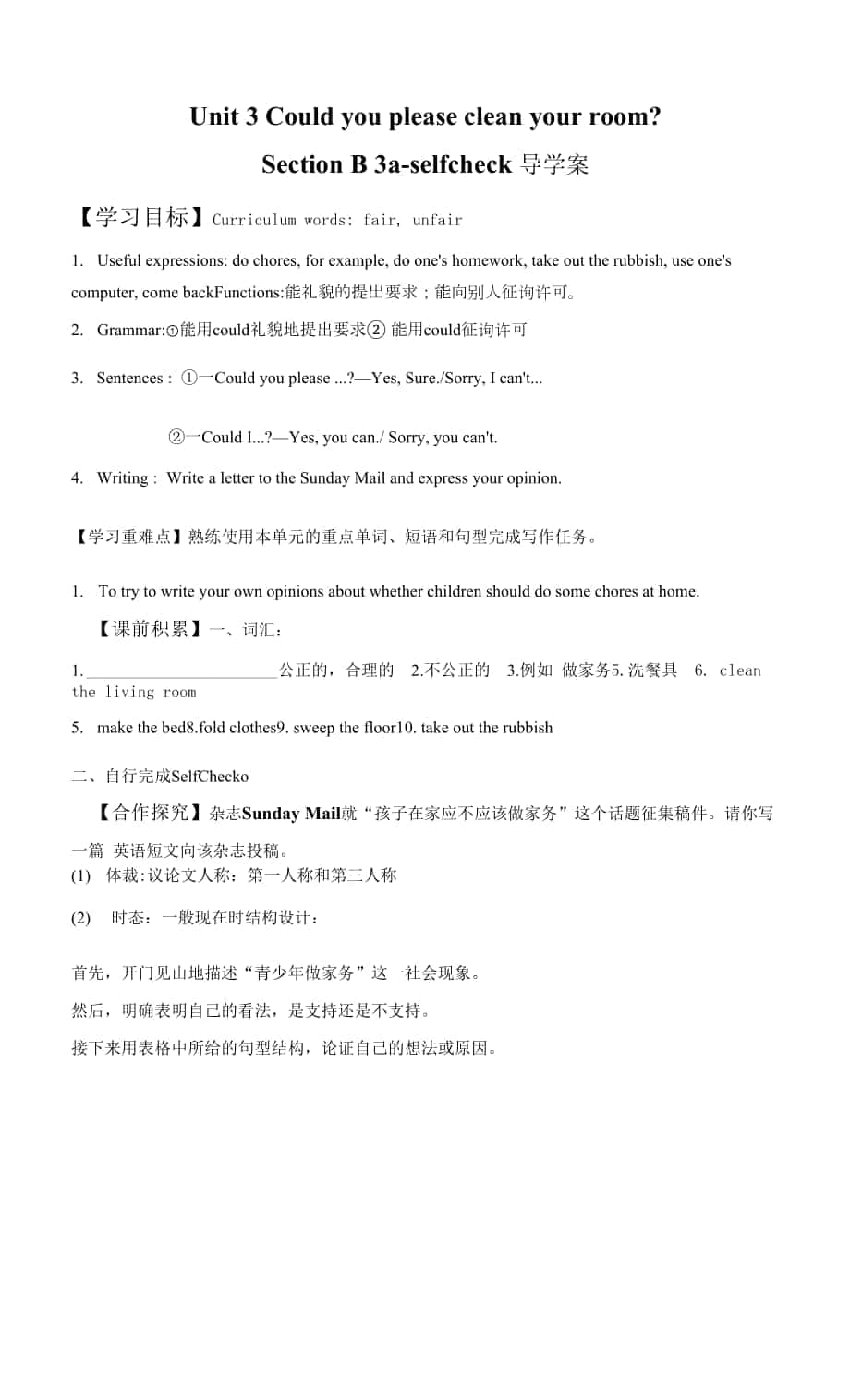《Unit 3 SectionB 3a-selfcheck導(dǎo)學(xué)案 人教版英語(yǔ)八年級(jí)下冊(cè).docx》由會(huì)員分享,可在線閱讀�,更多相關(guān)《Unit 3 SectionB 3a-selfcheck導(dǎo)學(xué)案 人教版英語(yǔ)八年級(jí)下冊(cè).docx(3頁(yè)珍藏版)》請(qǐng)?jiān)谘b配圖網(wǎng)上搜索�。
1����、Unit 3 Could you please clean your room?
Section B 3a-selfcheck 導(dǎo)學(xué)案
【學(xué)習(xí)目標(biāo)】Curriculum words: fair, unfair
1. Useful expressions: do chores, for example, do one's homework, take out the rubbish, use one's computer, come backFunctions:能禮貌的提出要求;能向別人征詢?cè)S可�。
2. Grammar:①能用could禮貌地提出要求② 能用could征詢?cè)S可
3. S
2、entences: ①一Could you please ...?—Yes, Sure./Sorry, I can't...
②一Could I...?—Yes, you can./ Sorry, you can't.
4. Writing: Write a letter to the Sunday Mail and express your opinion.
【學(xué)習(xí)重難點(diǎn)】熟練使用本單元的重點(diǎn)單詞����、短語(yǔ)和句型完成寫(xiě)作任務(wù)。
1. To try to write your own opinions about whether children should do some chores
3���、 at home.
【課前積累】一����、詞匯:
1. 公正的����,合理的 2.不公正的 3.例如 做家務(wù)5.洗餐具 6. clean the living room
5. make the bed8.fold clothes9. sweep the floor10. take out the rubbish
二、自行完成SelfChecko
【合作探究】雜志Sunday Mail就“孩子在家應(yīng)不應(yīng)該做家務(wù)”這個(gè)話題征集稿件��。請(qǐng)你寫(xiě)一篇 英語(yǔ)短文向該雜志投稿���。
(1) 體裁:議論文人稱:第一人稱和第三人稱
(2) 時(shí)態(tài):一般現(xiàn)在時(shí)結(jié)構(gòu)設(shè)計(jì):
首先����,開(kāi)門(mén)見(jiàn)山地描述“青少年做家務(wù)”這一
4����、社會(huì)現(xiàn)象。
然后����,明確表明自己的看法,是支持還是不支持��。
接下來(lái)用表格中所給的句型結(jié)構(gòu)��,論證自己的想法或原因��。
在文章結(jié)尾部分��,總結(jié)歸納自己的觀點(diǎn)��。
表明觀點(diǎn)[卜 < I thmk dulden should do chores at home ,]
孩子在家 應(yīng)不應(yīng)該 做家務(wù)
說(shuō)明理由
(5)常用句式:
X ?Pmetits wwk haid outside and if they do all the houEvotk at home.
(1)(他們會(huì)非常累).
? Children live m one house with then |>araiK so (2)(對(duì)
5����、父母來(lái)說(shuō),做所有的 家務(wù)是不公平的).At least childeii should do xiinple choiet;. Foi example. (3)(他們應(yīng)該打
掃他們的臥室或鋪床).
? Dang choies can help to develop chikkcii' n 中iiit of working haid
and it (4)(也能幫助埒養(yǎng)
孩子們的獨(dú)立性).If s good for then ftihiie
. So I believe that chilcfaen diould do chores at home JSome parents think
6���、...
I think children should not do chores because...
I think/believe that...
I agree/disagree that...
I think it is fair/unfair for children to...
2. Firstly,... Secondly,... Thirdly,...
3. In my opinion...
In a word...
本文在表明觀點(diǎn)后���,需要闡述支撐觀點(diǎn)的理由,為此���,可以先用Here are three reasons來(lái)承上 啟下�����,使文章過(guò)渡自然�����。然后具體的理由
7��、可以用first, second, third來(lái)銜接���,以使行文條理清 晰、緊密相連�。
(6)范文:
Dear Sir or Madam,I think that doing housework is good for children. I disagree that doing chores at home is a waste of time. Doing chores helps to develop children's independence. And I think it's fair for children to help their parents do somethi
8、ng at home, because their parents have to work hard all day, just (he same as they have stress on study. Children these days need to get good grades and take good care of themselves as well.
I think children should share some housework with their parents, because it's a good way to learn how to loo
9��、k after themselves. For example, they should help their parents do some cooking, because when they are alone at home, they can get themselves something to eat.
Yours turly,Li Hua
中考鏈接【2020 ?湖北省咸寧市】 眾志成城抗疫情,齊心向陽(yáng)迎春天����。隨著新冠肺炎疫情的有效控制,各校己經(jīng)陸續(xù)復(fù)學(xué)��,久 別的師生回到了熟悉的校園�����。復(fù)學(xué)后���,王老師在班上將開(kāi)展一個(gè)主題為“Share your life at home dur
10、ing the COVID-19"的演講活動(dòng)�,讓同學(xué)們分享疫情期間居家生活的經(jīng)歷和感受。 假如你是李華�����,請(qǐng)從以下四個(gè)方面寫(xiě)一份演講稿�����。
1 Study have online classes (上網(wǎng)課),do homework …Housework clean the rooms, cook the dishes ???
2 Leisure activities do sports, watch TV ???Feeling warm happy
寫(xiě)作要求:
1. 文章中勿出現(xiàn)真實(shí)的姓名和校名���。
2. 文章須包含所提供主要信息��,可適當(dāng)發(fā)揮�;行文連貫,條理清晰�����。
3. 詞數(shù)80?100個(gè)���,文章的開(kāi)頭已經(jīng)給出����,不計(jì)入總字?jǐn)?shù)�����。
Hello, everyone! Long time no see. It's my honor to share my life at home during the COVID-19 with you
 Unit 3 SectionB 3a-selfcheck導(dǎo)學(xué)案 人教版英語(yǔ)八年級(jí)下冊(cè).docx
Unit 3 SectionB 3a-selfcheck導(dǎo)學(xué)案 人教版英語(yǔ)八年級(jí)下冊(cè).docx

